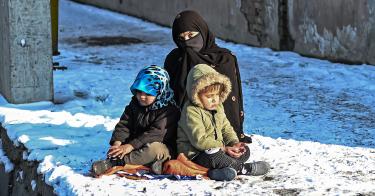“They are crying to have food. I wish I could bring them something, but we have nothing,” Zarmina, a 20-year-old Afghan mother, told The New York Times.
Zarmina has an 18-month-old, a 3-year-old, and another little one on the way. Her children are among the 3.2 million Afghan children that the World Food Programme (WFP) considers malnourished.
About 22.8 million Afghans, or 55% of the population, will face “high levels of acute food insecurity” between November 2021 and March 2022, according to the WFP’s October 2021 report. Of that number, nearly 9 million are experiencing a food emergency, which is one level above the worst conditions possible. Some classify it as a famine.
The situation in Afghanistan is already dire, and with winter fast-approaching, conditions are only expected to worsen.
While Afghanistan was food insecure prior to the U.S. withdrawal from the region, the situation was badly exacerbated by the botched U.S. pullout.
Not only did the poorly executed withdrawal leave hundreds of thousands of Afghans displaced and in danger, it also contributed to what the WFP anticipates will be a 35% increase in food insecurity from the same season last year.
The WFP report identifies drought, conflict since the start of 2021, and economic collapse as key causes of the current situation. Two of those three factors were exacerbated by the U.S. withdrawal from Afghanistan.
>>> America Must Stand Up for Fundamental Rights of Afghan Women
The world watched transfixed by the dramatic media coverage of Afghans streaming to the Kabul airport, desperately seeking safe passage from Taliban rule. The camera crews and reporters are largely gone now, but the human tragedy continues.
It is quite possible that the worst is still ahead. Thus, the humanitarian spirit that drove the resettlement of at-risk Afghans within our own borders may be even more necessary now, to ensure adequate humanitarian aid makes its way to Afghans left behind.
In the aftermath of the withdrawal, many Afghans aren’t getting paid. Work has dried up. The central bank system isn’t functioning properly. The Taliban is brutal—especially when it comes to their targeting of women and girls. Some families are so desperate that they are selling their daughters into marriage to make ends meet.
Efforts to provide relief are complicated by the Taliban’s poor governance and rampant corruption. As my Heritage colleagues argue, the U.S. must resist any temptation to recognize the Taliban as the legitimate government of Afghanistan. That means that no aid should pass through the hands of the Taliban.
The U.S. already allocated $474 million in 2021 to alleviate the humanitarian and refugee crisis in Afghanistan. This aid is being funneled through international humanitarian organizations to ensure that relief goes to the Afghan people and not the Taliban. The U.S. government has also sought complementary assistance from America’s private sector to provide relief.
Unfortunately, these efforts and others have fallen well short of meeting the great needs of Afghans. As of the October 2021 report, the WFP only had enough aid to provide for 40% of the needs it anticipates in the winter months ahead.
The American people and the Biden administration must step up.
America is the most generous country in the world, and the U.S. government has a moral obligation to provide assistance and galvanize international aid efforts to alleviate the immense suffering brought on by the Taliban in the aftermath of the precipitous U.S. withdrawal.
This piece originally appeared in The Washington Times



